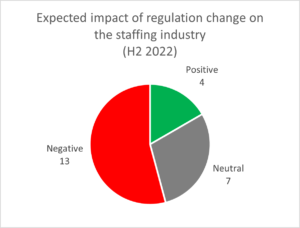Published on 24th November 2022
From the agency work perspective, the overall regulatory outlook for the period for the next six months is negative in 13 surveyed countries. In 7 countries, the impact of changes in regulation is expected to be neutral overall, while in 4 countries, the overall outlook is positive.
In 4 of the 24 surveyed countries, the staffing industry anticipates regulatory changes, which will have an overall strong and positive impact on the sector:
 In the Netherlands, a reform of the complementary pension scheme for agency workers based on a collective labour agreement is about to enter into force, which is assessed positively.
In the Netherlands, a reform of the complementary pension scheme for agency workers based on a collective labour agreement is about to enter into force, which is assessed positively.Negative impact of the regulatory change is expected in 13 surveyed countries:
WEC members can access a more detailed analysis of the SERO results on the Members’ Area.
WEC’s Staffing Executive Regulatory Outlook (SERO) is a bi-annual poll of top executives of National Staffing Federations around the world, where they assess the likelihood and potential impact of regulatory changes.
The results presented here are those of the October 2022 edition of the SERO, assessing the period from October 2022 till March 2023. Executives of 24 different national staffing federations have responded to this edition of the SERO.